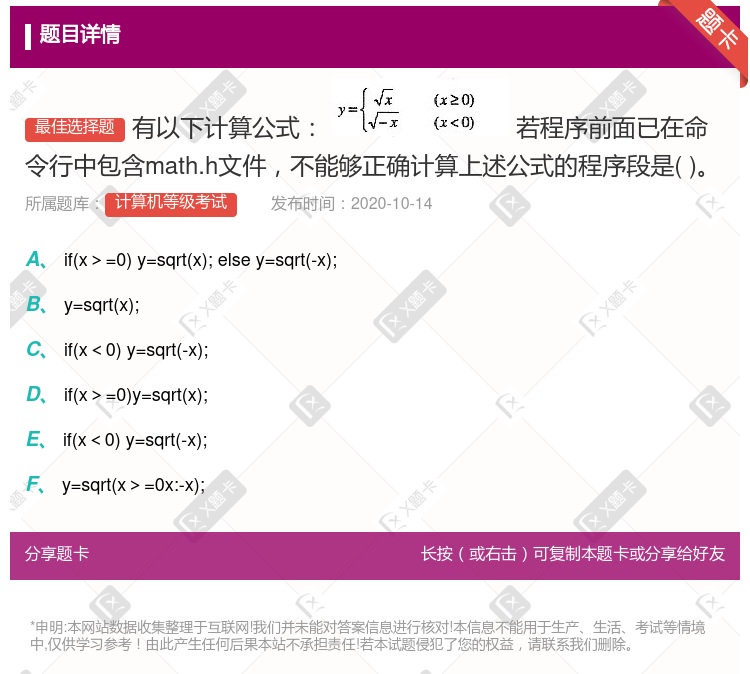你可能感兴趣的试题
isupper(c) 'A'<=c<='Z' 'A'<=c&&c<='Z' c<=('z'-32)&&('a'-32)<=c
预处理命令行必须位于C源程序的起始位置 在C语言中,预处理命令行都以"#"开头 每个C程序必须在开头包含预处理命令行:#include<stdih> C语言的预处理不能实现宏定义和条件编译的功能
isupper( 'A'<=c<='Z' 'A'<=c&&c<='Z' c<=('z'-32) &&('a'-32) <=c
y=sqrt(x); if(x<0)y=sqrt(-x); if(x>0)y=sqrt(x); else y=sqrt(-x); if(x>=0)y=sqrt(x); if(x<0)y=sqrt(-x); y=sqrt(x>=0x:-x);
if(x>=0) y=sqrt(x); else y=sqrt(-x); y=sqrt(x); if(x<0) y=sqrt(-x); if(x>=0) y=sqrt(x); if(x<0) =sqdrt(-x); y=sqrt(x>=0x:-x);
在程序中凡是以“#”开始的语句行都是预处理命令行 预处理命令行的最后不能以分号表示结束 #define MAX是合法的宏定义命令行 C程序对预处理命令行的处理是在程序执行的过程中进行的
预处理命令行必须位于C源程序的起始位置 在C语言巾,预处理命令行都以"#"开头 每个C程序必须在开头包含预处理命令行;#include <stdio.h> C语言的预处理不能实现宏定义和条件编译的功能
if(x>=0) y=sqrt(x); else y=sqrt(-x); y=sqrt(x); if(x<0) y=sqrt(-x); if(x>=0)y=sqrt(x); if(x<0) y=sqrt(-x); y=sqrt(x>=0x:-x);
isupper(c) 'A'<=c<='Z' 'A'<=c&&<='Z' c<=('z'-32)&&('a'-32)<=c
if(x>=0 y=sqrt(; else y=sqrt(-; y=sqrt( if(x<0)y=sqrt(-; if(x>=0) y=sqrt(; if(x<0)y=sqrt(-; y=sqrt(x>=0x:-;
isupper(c) 'A'<-c<='Z' 'A'<=c&&c<='Z' c<=('z'-32)&&('a'-32)<=c
isupper( 'A'<=c<='Z' 'A'<=c&&c<='Z' c<=('z'-32)&&('a'-32)<=c
预处理命令行必须位于C源程序的起始位置 在C语言巾,预处理命令行都以"#"开头 每个C程序必须在开头包含预处理命令行;#include <stdih> C语言的预处理不能实现宏定义和条件编译的功能
isupper( 'A'<=c<='Z' 'A'<=c&&c<='Z' c<=('z'-32)&&('a'-32)<=c
if(x>=0)y=sqrt(x); else y=sqrt(-x); y=sqrt(x); if(x<0)y=sqrt(-x); if(x>=0)y=sqrt(x); y=sqrt(x>=0 x:-x);
预处理命令行必须位于C源程序的起始位置 在C语言中,预处理命令行都以“#”开头 每个C程序必须在开头包含预处理命令行:#include <stdio.h> C语言的预处理不能实现宏定义和条件编译的功能
isupper(C) ‘A’<=c<=‘Z’ ‘A’<=c&&c=<‘Z’ c<=(‘Z’-32)&&(‘a’-32)<=C
if(x>=0) y=sqrt(; else y=sqrt(-; y=sqrt(; if(x<0) y=sqrt(-; if(x>=0) y=sqrt(; if(x<0) =sqdrt(-; y=sqrt(x>=0x:-;
isupper(c) 'A'<=c<='Z' 'A'<=c&&c<='Z' c<=('z'-32)&&('a'-32)<=c
